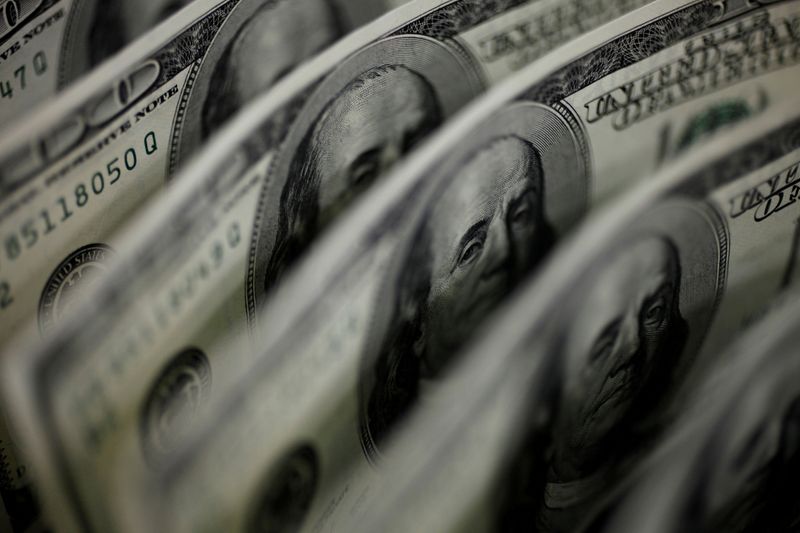By Chuck Mikolajczak
NEW YORK (Reuters) – The dollar index rose on Wednesday following comments from a host of global central bank leaders, including Federal Reserve Chair Jerome Powell, who did not rule out the possibility of another rate hike by the Fed at its next meeting in July.
Powell, speaking at a European Central Bank (ECB) conference along with Bank of England Governor Andrew Bailey, ECB President Christine Lagarde and Bank of Japan Governor Kazuo Ueda, noted that two rate rises are likely this year, and did not rule out the possibility of a rate increase at its next policy meeting set for July 25-26.
In addition, Powell also said he does not see inflation coming down to the Fed’s 2% target until 2025.
Expectations for a 25 basis point hike at the July meeting moved up to 81.8 from 76.9% a day earlier, according to CME’s FedWatch Tool.
“It’s not a big change. To me they are all reading from the same scripts from their recent central bank meetings,” said Erik Bregar, director, FX & precious metals risk management, at Silver Gold Bull in Toronto.
Earlier economic data showed the U.S. trade deficit in goods narrowed in May as imports fell, but was likely not enough of an improvement to keep trade from weighing on second quarter economic growth, although a rise in inventory investment could also offset the drag from trade.
The dollar index rose 0.371% to 102.870.
The yen, which has been under pressure as the BOJ has been an outlier among global central banks by keeping a loose monetary policy, weakened to a fresh 7-month low of 144.61 per dollar. BOJ Governor Kazuo Ueda said the central bank would see a good reason to alter its monetary policy if it became “reasonably sure” inflation would start to re-accelerate into next year after a period of moderating.
Softness in the yen has prompted warnings from Japanese currency officials this week that the central bank could intervene to prop up the yen, something that last took place when it traded around 145 per dollar.
“The only thing kind of notable to me is Ueda’s lack of pushback on yen weakness, so if his position is that other G7 policies are the more dominant factor for yen weakness, he is really opening the door here to further weakness,” said Bregar.
The Japanese yen weakened 0.16% to 144.27 per dollar while the euro fell 0.2% against the yen to 157.59 after earlier hitting a new 15-year high of 158.00.
Lagarde said the ECB is still not seeing enough evidence that underlying inflation has embarked on a downward path, while BoE Governor Andrew Bailey said it remained to be seen if financial markets are correct about the number of interest rate increases they are expecting from the British central bank and how long before the first cut is made.
Aside from Lagarde, ECB policymaker Francois Villeroy de Galhau said the length of time the ECB keeps rates elevated is more important than the level itself, although they are currently close to what is needed to get inflation on the path towards a 2% target.
The euro was down 0.35% to $1.0921 while sterling was last trading at $1.2647, down 0.78% on the day.



